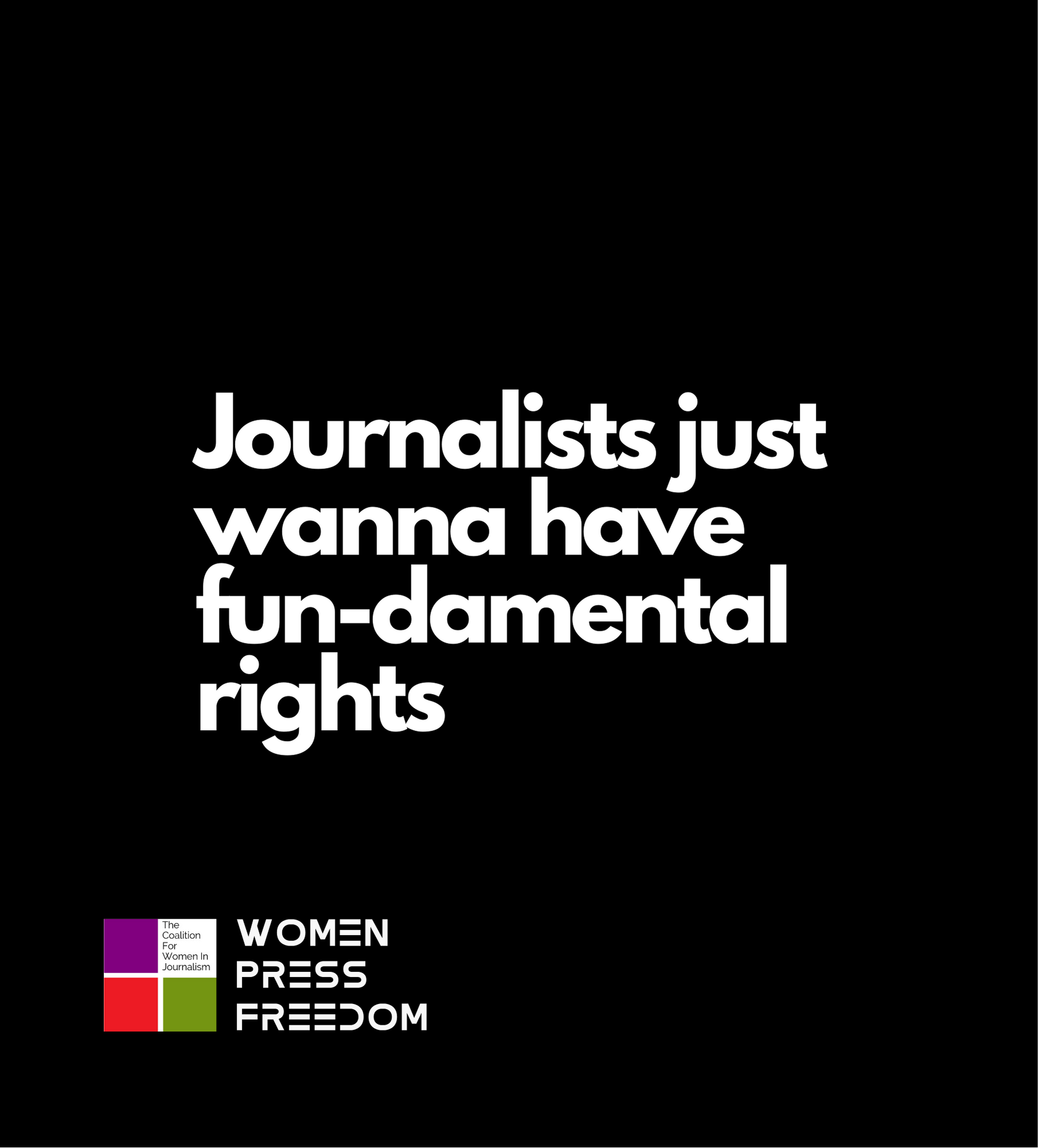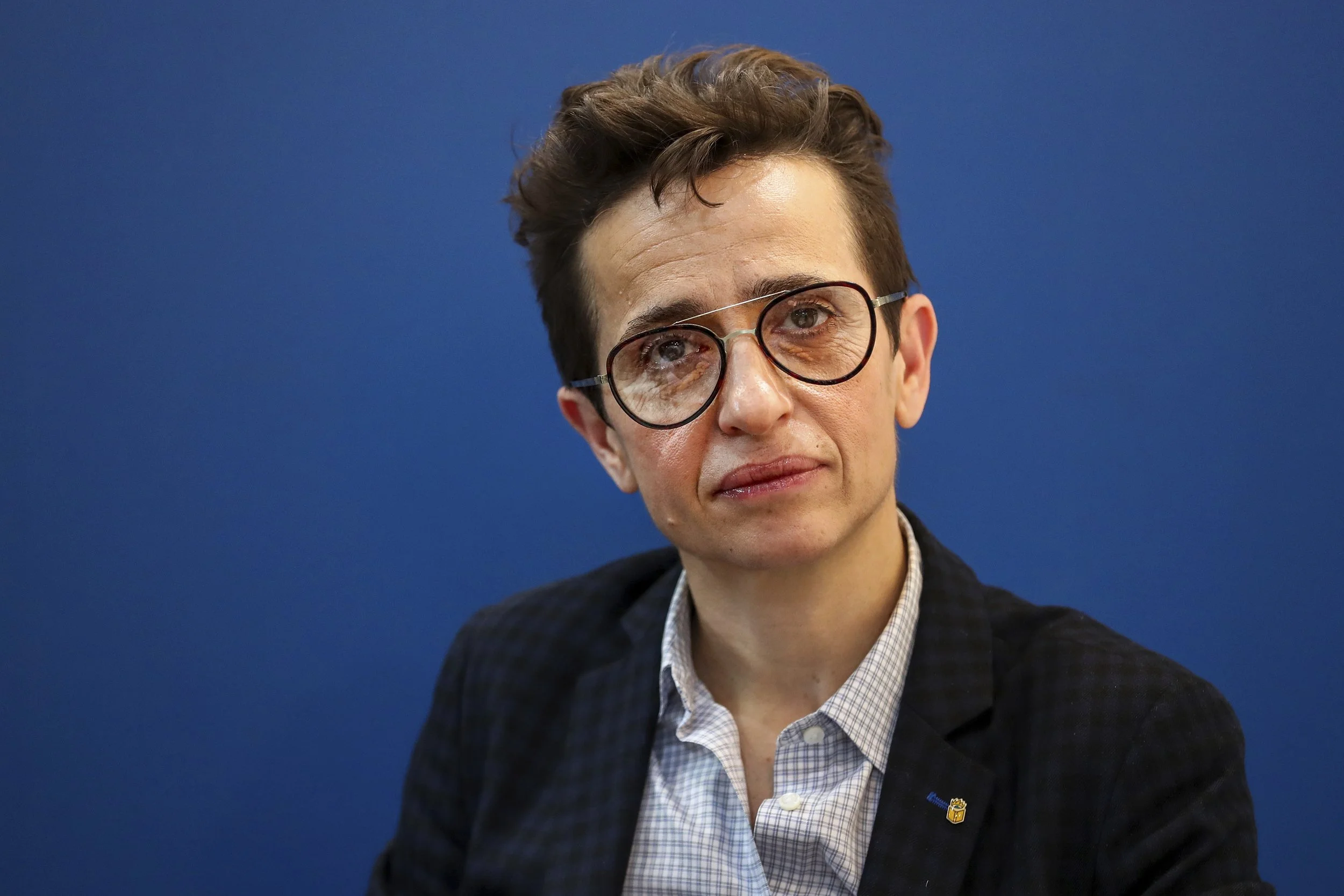Russia: Exiled Ekaterina Fomina Arrested in Absentia
Women Press Freedom strongly denounces the Kremlin’s cynical transnational repression tactics targeting journalists in exile
Location: Russia, Moscow
Date: June 17, 2024
Arrested in absentia, journalist Ekaterina Fomina faces charges for disseminating "fakes" about the Russian army — a clear retaliation against her investigative reporting, which exposed a Russian soldier's confession to murder in Ukraine. If convicted, she could be imprisoned for 5 to 10 years. This case exemplifies the Kremlin’s broader, sinister campaign to silence women and non-binary journalists critical of the government and military. Women Press Freedom urges the international community to stand in solidarity with Ekaterina Fomina and demand that Russian authorities cease their oppressive actions against the press.
During the ongoing Israel/Palestine conflict, the fundamental principles of press freedom have come under dire threat.
WPF strongly condemns the ongoing legal proceedings against Gözde Bedeloğlu, a journalist for BirGün, who is currently facing charges of "insulting a public official" in Istanbul, Turkiye, filed by a Nationalist Movement Party politician.
WPF welcomes the judgment of the Fair Work Commission that found that broadcaster Antoinette Lattouf was fired by the Australian Broadcasting Corporation (ABC) following a social media post by Lattouf sharing a Human Rights Watch claim about Israel's actions in Gaza.
On June 17, 2024, the Dorogomilovsky District Court of Moscow issued an arrest warrant for journalists Ekaterina Fomina and Roman Anin in absentia, accusing them of disseminating "fakes" about the Russian army driven by political hatred.
Both journalists fled Russia following the invasion of Ukraine in 2022 and currently reside in exile.
The accusations against Fomina first came to light in January. The pro-Kremlin news agency TASS reported that the charges were linked to her investigative work, particularly a piece involving Russian Armed Forces Gefreiter Daniil Frolkin. In this investigation, Frolkin confessed to the murder of a Ukrainian civilian, a revelation that provoked the ire of Russian authorities.
In response to Russian authorities’ accusations of blackmail and spreading false information, Fomina vehemently denies having any compromising material on Frolkin. She asserts that her interactions were purely journalistic and that Frolkin voluntarily disclosed information, seeking to expose wrongdoing within his unit rather than engage in deceit.
The reason for Roman Anin’s warrant remains unclear. Echoes of past legal pressures against him hint at a recurring pattern of targeting investigative journalists who expose sensitive information about influential figures.
Fomina is facing charges of spreading “fake news” about the Russian army aimed at stoking political animosity. The Kremlin's definition of "fake news" encompasses information contradicting official narratives or highlighting sensitive topics, including military operations. Since Russia’s full-scale invasion of Ukraine in 2022, the Kremlin introduced strict military censorship laws aimed at criminalizing independent reporting on its military activity. These laws have seen the banning of several media outlets, the mass exodus of journalists from Russia, and lengthy imprisonments handed to those in the country. Siberian journalist Maria Ponomarenko was sentenced to six years behind bars in 2023.
Russia continues to issue arrest warrants for numerous journalists, including Veronika Belotserkovskaya and Marina Ovsyannikova, as part of its crackdown on dissent. This is just one of the tactics employed by Putin’s government to target journalists, particularly Russian exiles, beyond its borders. Russia is the most prolific perpetrator of transnational repression against women journalists. It is responsible for 20 of Women Press Freedom’s documented cases in the first four months of 2024. These violations include legal harassment, where journalists like Anastasiya Zhvik and Maria Menshikova face charges and criminal investigations for reporting on sensitive topics. Foreign agent designations are also used to stigmatize and marginalize journalists like Anna Narinskaya and Asya Kazantseva.
The arrest warrants issued for Ekaterina Fomina and Roman Anin epitomize the Kremlin’s alarming trend of using legal tools to target dissenters, especially those in exile. This tactic not only undermines the fundamental principles of free expression but also serves as a grim reminder of the lengths to which authoritarian regimes will go to control the narrative. The international community must condemn these actions unequivocally and support journalists who risk their lives to expose the truth.
Women Press Freedom urges governments, human rights organizations, and media entities to take a firm stance against transnational repression tactics. Exiled journalists facing persecution must be offered protection in the countries where they reside, and those who suppress press freedom must be held accountable.
WPF is deeply saddened by the death of Ukrainian journalist Victoria Roschyna, who died under unclear circumstances while being transferred to a Moscow prison. The circumstances of her death remain uncertain, but one fact is clear: the Kremlin bears responsibility.
WPF strongly condemns the criminal charges brought against Ukrainian journalists Diana Butsko, Olesya Borovik, and CNN’s Nick Peyton Walsh by Russian federal security services for their coverage of Ukrainian military incursion into the Kursk region.
WPF is alarmed that the well-known journalist is facing issues traveling due to the Kremlin’s concerted and unjust transnational repression tactics
WPF strongly condemns Moscow's legal threats against Italian journalists Stefania Battistini and Simone Traini, who work for the Italian public broadcaster RAI. The journalists stand accused of "illegal border-crossing" after reporting on Ukraine’s counter-invasion in Russia's Kursk region.
WPF is delighted that Russian-American journalist Alsu Kurmasheva has been released from prison in Russia and is finally, after ten grueling months, able to return home to family in Prague.
WPF condemns the sentencing of Ukrainian TV presenter Natalia Moseychuk to five years in prison by a Moscow court, in yet another transnational repression attack on press freedom.
WPF condemns the Kremlin’s relentless legal harassment of exiled journalists under “foreign agent” law.
Elizaveta Surnacheva is now facing a second prosecution for failing to comply with the reporting requirements imposed on those labeled as “foreign agents.”
Olga Komleva, a reporter and activist from Ufa, is facing mounting legal pressures and accusations.
In a stark affront to press freedom, a Russian court has convicted American journalist Alsu Kurmasheva in a secret trial, sentencing her to six and a half years in prison.
Exiled journalist Lyudmila Savitskaya has been subjected to continuous legal and financial harassment by the Russian regime, WPF is worryingly documenting.
War photographers Olga Kovalova and Vladyslav Krasnoshchok were injured by Russian shelling while covering the conflict in Toretsk, Donetsk.
Women Press Freedom condemns the continued persecution of journalist who has faced years of harassment.
WPF strongly condemns the ongoing persecution of journalists by the Russian government, which continues to label independent news outlets as “undesirable.”
WPF strongly denounces this transnational repression and calls on the international community to stand in solidarity with Taratuta and other exiled journalists who remain vulnerable to state-sanctioned reprisals from Russia for continuing to report.
Russian-US journalist and author Masha Gessen was convicted in absentia by a Moscow court on charges of spreading false information about the military.
The Kremlin has initiated yet another deplorable attack on press freedom by opening an administrative case against exiled journalist Yulia Latynina.
The Interior Ministry issues arrest warrants for at least 13 women and non-binary journalists.
Court arrests Lazareva in absentia following search warrant by Ministry of Internal Affairs. The renowned journalist is unjustly accused of justifying terrorism.
The deepfake targeting France 24 and journalist Catalina Marchant de Abreu is a serious threat to press freedom and public trust.
WPF vehemently condemns the recent decision by a St. Petersburg court to label the journalist couple Lydia Nevzorova and Aleksandr Nevzorov as an “extremist union.”
WPF denounces additional fines slapped on Baranova for “failure to comply with foreign agent law”
Russian military forces detained Zhanna Kyseliova, editor of the Kakhovska Zoria newspaper, on June 27, 2024, in Kakhovka, Kherson, following a raid on her apartment.
On July 1, 2024, Ukrainian authorities reported the detention of Zhanna Kyselova, a journalist and former editor of the newspaper Kakhovska Zorya, by Russian occupying forces in Ukraine’s Kherson region. Kyselova was detained at her apartment in Kakhovka on June 27, and her current location remains undisclosed.
WPF denounces Russia’s decision to revoke the accreditation of Carola Schneider, a seasoned Moscow correspondent for Austria’s ORF.
WPF unequivocally condemns the Kremlin’s persistent and cynical use of transnational repression to silence dissenting voices, both domestically and abroad.
Arrested in absentia, journalist Ekaterina Fomina faces charges for disseminating "fakes" about the Russian army — a clear retaliation against her investigative reporting, which exposed a Russian soldier's confession to murder in Ukraine.
WPF condemns in the strongest terms the Russian Foreign Ministry's decision to revoke the accreditation of Austrian journalist Maria Knips-Witting and order her expulsion from the country.
WPF condemns in the strongest terms the recent actions taken by Rosfinmonitorin in designating journalists Maria Menshikova and Anna Loiko as “terrorists and extremists.”

Women Press Freedom is an initiative by The Coalition For Women In Journalism
The Coalition For Women In Journalism is a global organization of support for women journalists. The CFWIJ pioneered mentorship for mid-career women journalists across several countries around the world and is the first organization to focus on the status of free press for women journalists. We thoroughly document cases of any form of abuse against women in any part of the globe. Our system of individuals and organizations brings together the experience and mentorship necessary to help female career journalists navigate the industry. Our goal is to help develop a strong mechanism where women journalists can work safely and thrive.
If you have been harassed or abused in any way, and please report the incident by using the following form.






























